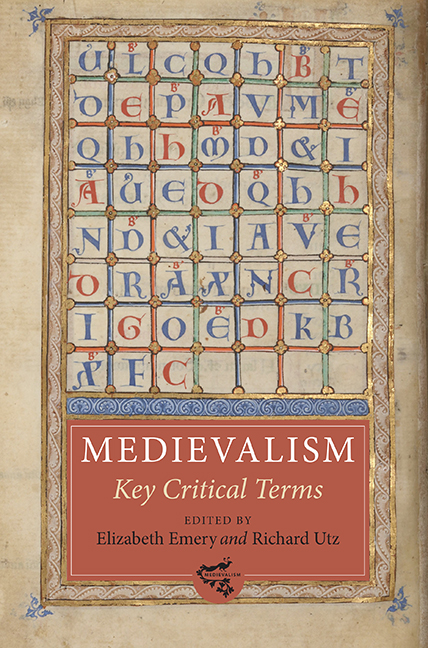Book contents
- Frontmatter
- Dedication
- Contents
- List of Illustrations
- List of Contributors
- Making Medievalism: A Critical Overview
- 1 Archive
- 2 Authenticity
- 3 Authority
- 4 Christianity
- 5 Co-disciplinarity
- 6 Continuity
- 7 Feast
- 8 Genealogy
- 9 Gesture
- 10 Gothic
- 11 Heresy
- 12 Humor
- 13 Lingua
- 14 Love
- 15 Memory
- 16 Middle
- 17 Modernity
- 18 Monument
- 19 Myth
- 20 Play
- 21 Presentism
- 22 Primitive
- 23 Purity
- 24 Reenactment
- 25 Resonance
- 26 Simulacrum
- 27 Spectacle
- 28 Transfer
- 29 Trauma
- 30 Troubadour
- Index
- Medievalism
26 - Simulacrum
Published online by Cambridge University Press: 08 October 2022
- Frontmatter
- Dedication
- Contents
- List of Illustrations
- List of Contributors
- Making Medievalism: A Critical Overview
- 1 Archive
- 2 Authenticity
- 3 Authority
- 4 Christianity
- 5 Co-disciplinarity
- 6 Continuity
- 7 Feast
- 8 Genealogy
- 9 Gesture
- 10 Gothic
- 11 Heresy
- 12 Humor
- 13 Lingua
- 14 Love
- 15 Memory
- 16 Middle
- 17 Modernity
- 18 Monument
- 19 Myth
- 20 Play
- 21 Presentism
- 22 Primitive
- 23 Purity
- 24 Reenactment
- 25 Resonance
- 26 Simulacrum
- 27 Spectacle
- 28 Transfer
- 29 Trauma
- 30 Troubadour
- Index
- Medievalism
Summary
JEAN BAUDRILLARD'S DEFINITION of the simulacrum as “a copy without an original” is deliberately paradoxical and provoking. If there is no original, how could there possibly be a copy, since the term “copy” depends for its meaning on the idea of an original for comparison (a “good” or “bad” copy). Although the term was designed to describe the hyperrealistic nature of twentieth-century Western or Westernized culture, the definition has even more resonance for the study of medievalism, since there can be no original. Imagine, for example, that you could go back to the tenth century and attend a celebration in a mead hall; you could even bring a video camera. Nonetheless, you could not bring back an original; your presence itself would change the past, and even if you were invisible, a recording would be necessarily subjective, and probably reveal more about you than it would about the period, the event, or the participants, no matter how much you presented it as authentic history. The presence of the simulacrum haunts traditional medievalism and its desire to re-create the period. For postmodern or neomedievalism, the same impossibility of accessing an original provides a way of critiquing or challenging traditional medievalism and creates a space for neomedievalism's deliberate play with the inevitably constructed nature of all re-creations of the Middle Ages.
Before addressing the specific importance of the “simulacrum” for the study of “neomedievalism,” both terms should be defined and elucidated. Put as simply as possible, a simulacrum is something that subverts our ability to distinguish between what is real and what is represented. Moreover, it calls into question the hierarchy of reality over representation. Think, for example, of the public unease caused when several fashion photographers decided to stop using expensive and necessarily imperfect human models and instead to rely on digitally created ones, or the inversion of hierarchy implied when one sees a beach and says, “It looks just like a postcard!” This simplified definition of the simulacrum, however, cannot address the levels of complexity the term has acquired over centuries of use, study, and debate. “Medievalism” and “neomedievalism” are similarly problematic terms, particularly since some writers use them interchangeably.
- Type
- Chapter
- Information
- Medievalism: Key Critical Terms , pp. 223 - 230Publisher: Boydell & BrewerPrint publication year: 2014



